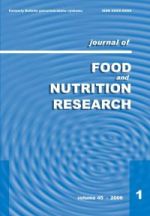Scientific journal
Journal of Food and Nutrition Research
Summary No. 4 / 2014
Szczuko, M. – Seidler, T. – Gutowska, I. – Stachowska, E.
Impact of socio-economic factors and nutritional education on the composition of daily diet of university students
Journal of Food and Nutrition Research, 53, 2014, No. 4, s. 291-303
Małgorzata Szczuko, Department of Biochemistry and Human Nutrition, Pomeranian Medical University in Szczecin, Broniewskiego Str. 24, 77-460 Szczecin, Poland.
Tel.: 091-441-48-06, e-mail: szczukom@poczta.onet.pl; malgorzata.szczuko@pum.edu.pl
Summary: The purpose of this study was to analyse whether socio-economic factors would influence the composition of daily diet (DD), as well as to answer the question if nutritional education ran for a few months could have a beneficial effect on a change in diet. Food consumption patterns were estimated in a group of 504 students from Poland, aged 22–25, by interview on food intake during the last 24 h. The amount of 30 nutrients was calculated using a computer program „Dietetyk 2” (National Food and Nutrition Institute, Warsaw, Poland). In the group of women, the content of nutrients in DD was more favourable among the women whose parents had higher education, but the most vulnerable to diseases of affluence were considered to be those whose parents had a high school education. Among the most significant negative socio-economic impacts was the place of residence during the period of study. The most health threatening was living in a dorm. Family economic self-evaluation made by students was subjective and this prevented the observation of differences. Education on rational diet was more effective in the group of women than in the group of men.
Keywords: nutrition; educating parents; place of residence; economic self-evaluation; nutritional education
Download:
(pdf, 113.15 Kb, 5354x)










